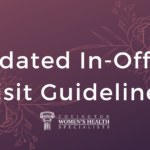Abnormal Pap Test Result? Read This First
You’ve gotten through your Pap test, and you are glad that it is over with! But if you’ve received news that your Pap smear results are abnormal — what to do? First of all, don’t panic. This happens to as many as 1 in 5 women. Remember the Pap test is a screening test looking for abnormal cervical cells that could eventually become cervical cancer. Paps prevent cervical cancer by finding abnormalities before it turns into cancer. But it can also pick up infections.
Here’s a closer look at what your results could mean, and what may happen next
The Pap test has two parts. First, the cervical cells are looked at to determine if they are normal or abnormal, to see what part of the cervix they came from and to make sure there are enough cells to look at. Second, for some people, a test for human papillomavirus (HPV) is done.
The cervix is shaped like a doughnut, cells from the center (doughnut hole) and the outside surface of the cervix are needed. The cells might look completely normal, but if there are not enough cells or if cells from the center are not seen, the Pap will be classified as abnormal, and will have to be repeated in 3 – 4 months.
If a vaginal infection such as yeast or a parasite is found, medication can be prescribed electronically to your pharmacy. And your sexual partner may need to be treated, too.
If abnormal or unusual cells are discovered on your Pap, you might have an area on your cervix where there are abnormal cells caused by human papillomavirus (HPV). Returning to the office for additional testing will be needed to look for that abnormal area on the cervix.
But even if HPV has caused abnormal cells to grow, in some cases, these changes in your cervical cells can return to normal without any medical intervention. To keep your cervix healthy, lifestyle changes are recommended. Don’t smoke cigarettes, take a women’s vitamin which contains folic acid and exercise regularly. Eat colorful fruits and vegetables as these contain nutrients that support our immune systems to help keep HPV spreading and damage to a minimum.
What if my Pap requires follow up testing?
The cervix will be examined under magnification and biopsies will be done. This is called a colposcopy. This is an in-office procedure which usually only takes about five to 10 minutes, and post-procedure symptoms are very minimal. You may experience slight cramping that over-the-counter pain medications can help alleviate, and you may notice a dark discharge for several days.
A cervical biopsy can show if “precancerous” or cancerous cells are present. A “pre-cancerous condition” is not cancer yet, but it could turn into cancer left unidentified, unmonitored, and therefore unaddressed. Having the additional testing will help determine if you need treatment to prevent the development of cancer.
We understand that while hearing that you’ve gotten a positive Pap test may not feel like the best news in the world, the reality is that it’s very beneficial to detect abnormalities very early on with regular Pap screenings. These cellular changes happen over the course of as long as several years. However, with a Pap test, your provider can often prevent you from getting cancer altogether, because the abnormal cells can be treated well before they progress to a harmful stage.
Treatment of a “pre-cancerous” condition
About 40% of women who receive a biopsy after a positive Pap test require no additional treatment, other than follow-up Pap test within a certain period of time. If it is determined that you’d benefit from further treatment, removal or ablation of the abnormal cervical tissue is the next step. The most common treatment is to remove the abnormal portion of the cervix by loop electrosurgical excision procedure (LEEP), but treatment will be tailored to you.
Even if you’re told that you need further treatment after a positive Pap test, try not to panic. The procedures we use are minimally invasive, and our team is committed to helping you take a proactive approach to your reproductive health. To schedule a Pap smear or follow-up appointment with our team, call (770) 385-8954 or request an appointment online.








